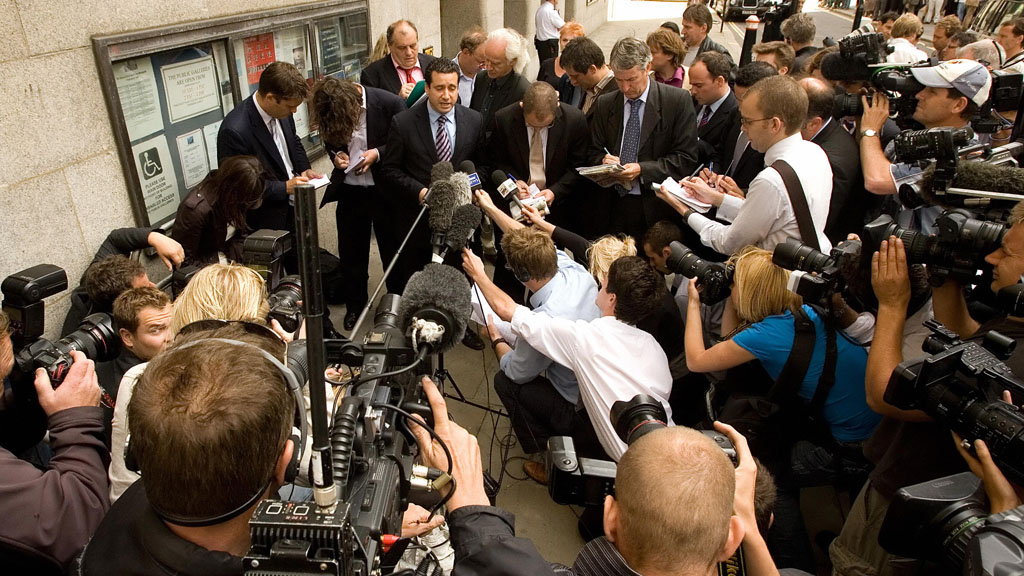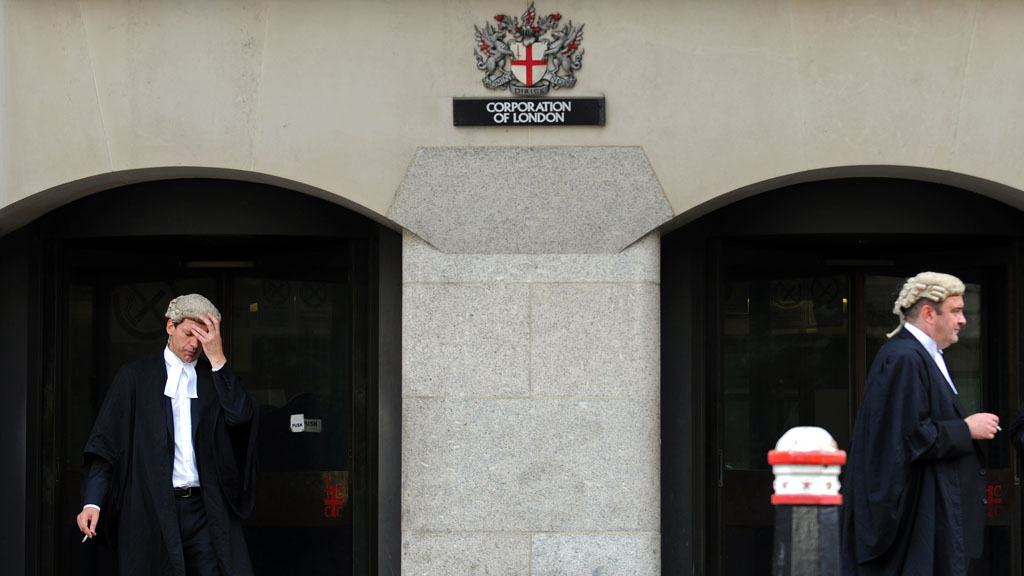Why there is no courtroom drama like the real thing
The strange world of the courts is finally opening up to TV audiences. Former court reporter Patrick Worrall wonders what viewers will make of it all.

The moon landings. Frost/Nixon. Dennis Taylor surging back to snatch the 1985 World Snooker final from the jaws of Steve Davis.
It’s just possible that today’s historic first broadcast from an English court will go down in history as one those great TV moments when the whole country tunes in as one and silence descends on the windblown terraced streets.
If huge numbers of people do decide to watch the action from the Court of Appeal, I suspect it won’t be for long.
Spectating at a criminal trial is an ancient, inalienable democratic right. It is our public duty to check up on how justice is being dispensed in our name.
Unfortunately actually watching a trial unfold in real time can be one of the most tedious experiences known to man.
Forensics, phone signals and CCTV evidence can swallow days. Jurors try to steel themselves for the emotional stress of deciding the fate of the accused, but nothing can prepare you for a week of mobile phone triangulation.
Of course criminal trials can also provide heart-stopping moments, as TV dramatists know. The trick is to pick the right case and to know when to tune in.
This is where court reporters come in. I used to be one. Old Bailey mostly – lots of terrorism and a few big murder trials like Damilola Taylor.
We’re not allowed to watch that sort of thing yet, just appeal cases for now, where there are no juries to prejudice. But surely one day cameras will be allowed in all Crown Courts.
When that happens the journalists who used to act as the eyes and ears of the public will no longer be needed. With the ban on filming the action lifted, there will be no need to take everything down in frantic shorthand, then sprint out of court to file your copy before your rivals.
Court artists and court reporters will become extinct and will probably die unmourned, except by a few people like me, who remember what it was like to be one of the privileged few, squeezed into the doorways of stuffy rooms, waiting for the jury foreman to give us tomorrow’s front page headline.
He couldn’t answer because they’d murdered him. Hadn’t you, you b*******?
So many moments. I remember Damilola’s killers howling in savage outrage and having to be dragged from the dock when the guilty verdicts were handed down.
I’ll never forget the armed robber bursting into song in the witness box in a bid to convince the jury that he was a harmless aspiring musician (it didn’t work).
The widow of the car salesman, elegant in black, was telling the court about his final moments: “I never saw him again. I tried to phone him at one o’clock and he didn’t answer.”
She turned to look at the men in the dock.”He couldn’t answer because they’d murdered him.” She had waited for years to look them in the eyes. “Hadn’t you, you b*******?”
Objection!
Watch today’s proceedings for a few minutes and you might find that everything you think you know about the courts is wrong.
Nobody ever shouts “objection!” (only in America), judges never bang the bench with a gavel (only for auctioneers), and they never yell “clear the court!” when there’s a kerfuffle in the public gallery.
British barristers never descend into slanging matches – baroque politeness is the order of the day – and while there’s plenty of showboating, they don’t parade up and down in front of the jury box when they make their closing speeches.
Actually, I’m really curious as to how viewers will take to real barristers when they get used to seeing them in action on the TV screen.
Some lawyers, mostly on the defence side, will inevitably struggle to get a lot of public sympathy.
We all read stories in the newspapers about the ordeal faced by rape victims in court. But you don’t feel real outrage until you actually watch a woman being slowly and mercilessly reduced to tears by a plummy-voiced man who has made this kind of torment a professional speciality.
Will defence counsel tone down the aggression if they think the world is watching them? Would the barrister who suggested that the teenage girl raped by her schoolboy client was so overweight she would have been “glad of the attention” have thought better of it with cameras in the room?
As repellent as these things sound, there are perfectly good reasons why defence barristers have the right to question witnesses and complainants as vigorously as their clients will be grilled in turn.
Other aspects of the proceedings might well strike viewers as simply an expensive sham.
Many murder trials boil down to a debate about the killer’s mental state. If sane, he is a murderer and is heading to prison. If mad, he is guilty only of manslaughter and will see out his sentence more comfortably in a mental hospital.
The question is usually decided on the basis of evidence from two supposedly independent psychiatrists, hired by the prosecution and defence, who just happen to have implacably opposite views on the matter. Then the jury picks which “expert” opinion it prefers. They may as well flip a coin.

New kind of hero?
On the other hand, I think the crown prosecutor could emerge as a new kind of hero: fearsomely intelligent, committed (even the richest criminal barristers make far less money than their colleagues in corporate law) and ruthless, in the best possible way.
Court reporters sit around and argue over top prosecutors the way that fight fans talk about boxers. Who’s the best, pound-for-pound? We all had our favourites.
Mine was Brian Altman QC, vanquisher of Milly Dowler’s repulsive killer Levi Bellfield, among others. Mr Altman is an expert cross-examiner, breaking down the hardest of the hard men with patient, remorseless logic, trapping them with their own lies.
The boy from Peckham probably wasn’t a worthy opponent, certainly not in Bellfield’s league, but he was already a dead-eyed killer at 14, and he needed to be off the streets.
After they robbed the wedding guests and shot the woman holding the baby, he and his friends stashed the loot in a safe in his bedroom, later found by the police.
But the boy had a story. The cash was all from his mum. He had been saving up his weekly pocket money and keeping it in the safe.
It was a preposterous defence, delivered with a sneer. The jury may well not have believed him anyway. But Mr Altman had a card to play.
So why was there so much foreign currency in the safe? You could just about make out the sound of a prison door clanging shut.
The boy’s response was to shriek helplessly at his defence team. Obviously, no one had reminded him about the foreign money or coached him about what to say.
There was no plausible answer, and the boy was scared now, but when you are alone in the witness box, facing Brian Altman QC, no one can help you. No one can pull you out of the ring.
So many moments, so much drama, so much skill and learning leveraged against the people who kill us and steal from us. But you have to know when to tune in.
I’m in two minds about having TV cameras in every court. Their presence will make some of the most highly skilled (and thirstiest) operators in Fleet Street redundant overnight.
On the other hand, there’s no serious argument against making justice as open as possible via a television feed.
It’s just that maybe we’re going to need an edited highlights package too.
-
Latest news
-
Windrush scandal: returning to the UK after a forty year wait6m

-
Netanyahu ‘survival’ depends on ‘expanding war’ says head of Palestinian National Initiative5m

-
Proposed law change could strip parental rights from paedophiles5m

-
Hugh Grant settles privacy lawsuit against The Sun newspaper publisher2m

-
Post Office Scandal: what did top executive know?6m

-




